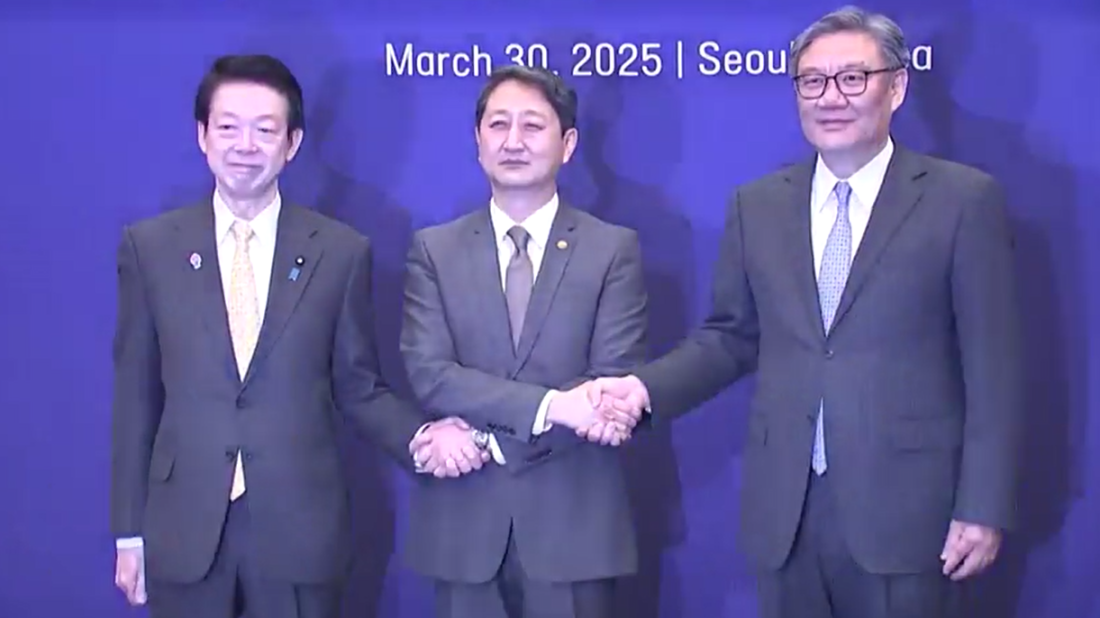Trump calls Israeli president ‘disgraceful’ over Netanyahu pardon refusal
U.S. President Donald Trump said Israeli President Isaac Herzog is “disgraceful” for not granting a pardon to Prime Minister Benjamin Netanyahu, a...

China is exploring the establishment of a trilateral currency swap agreement with Japan and South Korea.
The move is aimed at strengthening regional financial cooperation and reducing dependence on the US dollar as trade tensions with Washington escalate.
The proposal, currently under discussion among financial officials, would allow the three major East Asian economies to exchange and settle trade in their own currencies, thereby insulating their markets from external shocks and potential sanctions.
The initiative comes as US tariff threats under President Donald Trump’s trade agenda weigh heavily on East Asia’s export-driven economies.
Washington’s protectionist stance and its push to repatriate manufacturing have disrupted long-established supply chains, prompting regional powers to seek greater financial autonomy and cooperation.
By expanding currency swap lines, Beijing hopes to stabilise liquidity flows, facilitate regional trade, and promote wider use of the yuan in cross-border transactions.
For years, China, Japan, and South Korea have maintained complex and often strained relations, marked by territorial disputes, wartime history issues, and economic competition.
Diplomatic mistrust and political sensitivities have long impeded deeper regional cooperation, even as their economies became increasingly intertwined.
Yet, the mounting trade and geopolitical pressures from the United States appear to be fostering a new sense of pragmatism among the three nations.
Economic Ministers from the three countries met earlier in the year, the first meet in five years, at the height of President Trump's tariff war to discuss efforts to mitigate its impact.
Analysts say the proposed currency swap reflects a strategic convergence born out of necessity.
Faced with a volatile global environment, the three countries are finding common ground in safeguarding their economic stability and regional influence.
The arrangement would not only provide a buffer against exchange-rate volatility and capital flight but also signal a collective step toward financial independence from the dollar-centric system.
For Beijing, the plan aligns with its ambition to internationalise the yuan and enhance its role in regional finance.
Tokyo and Seoul, while cautious, recognize the potential benefits of a more balanced financial framework that can mitigate risks from future trade disputes.
If realised, the trilateral currency swap would mark a significant shift in East Asia’s economic landscape by transforming former rivals into collaborators under the shadow of US trade pressure.
A senior adviser to Iran’s Supreme Leader said on Tuesday that negotiations with the United States must remain focused on the nuclear issue and be grounded in realism, as Washington and Tehran prepare to resume talks mediated by Oman.
James Van Der Beek, who rose to fame as Dawson Leery in the hit teen drama Dawson’s Creek, has died aged 48 following a battle with stage 3 colorectal cancer.
Canadian Prime Minister Mark Carney said a bridge project linking Canada’s Ontario province with the U.S. state of Michigan would contribute to cooperation between the two countries.
U.S. President Donald Trump and Prime Minister of Israel Trump hosted Netanyahu for closed-door talks focused on negotiations with Tehran, Gaza and wider rBenjamin Netanyahu ended a two-and-a-half-hour meeting at The White House on Wednesday without reaching agreement on how to move forward on Iran.
Mexican Alpine skier Lasse Gaxiola will have his mother for company on his Olympic debut but she will not be cheering him from the finish area in Saturday's giant slalom in Bormio because she will be three hours away preparing her own race.
U.S. President Donald Trump said Israeli President Isaac Herzog is “disgraceful” for not granting a pardon to Prime Minister Benjamin Netanyahu, adding that he “should be ashamed of himself”.
Ukraine’s allies have pledged nearly $48bn in military support at a meeting of the Ukraine Defence Contact Group in Brussels, vowing to intensify pressure on Russia and strengthen Kyiv’s battlefield position.
Medical group accuses paramilitary force of targeting civilians in al-Kurqal area, urges international action to protect residents.
Day 6 of the Milano Cortina 2026 Winter Olympics brought fans and photographers unforgettable moments of athleticism, determination and sheer joy. From the ice rinks of Milan to the snowy slopes of Livigno, athletes pushed themselves to the limit delivering breathtaking performances.
U.S. border chief Tom Homan said on Thursday (12 February) a federal immigration crackdown in Minnesota will end after months of raids that led to more than 4,000 arrests, mass protests and two fatal shootings.
You can download the AnewZ application from Play Store and the App Store.

What is your opinion on this topic?
Leave the first comment